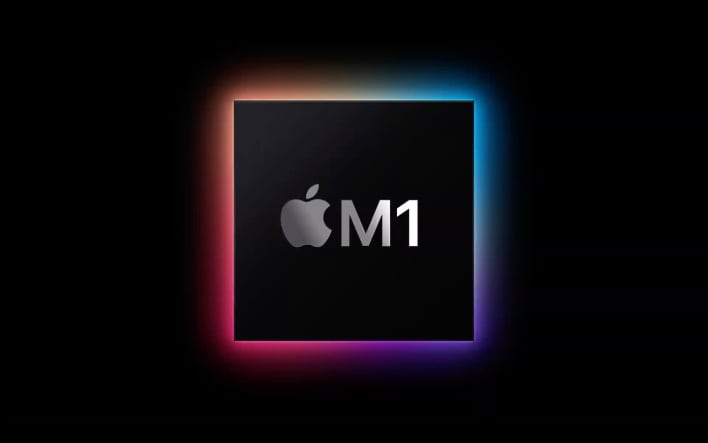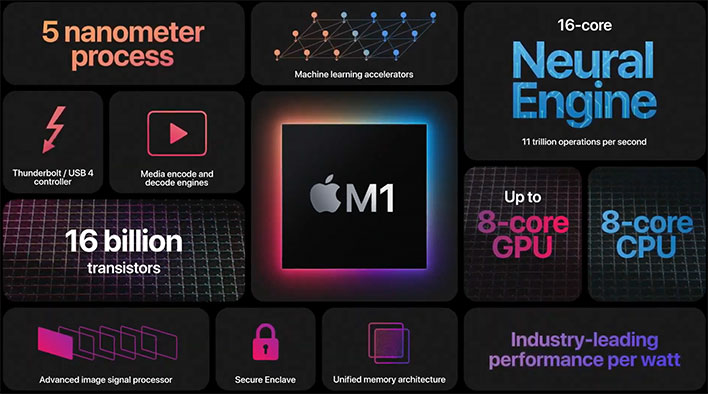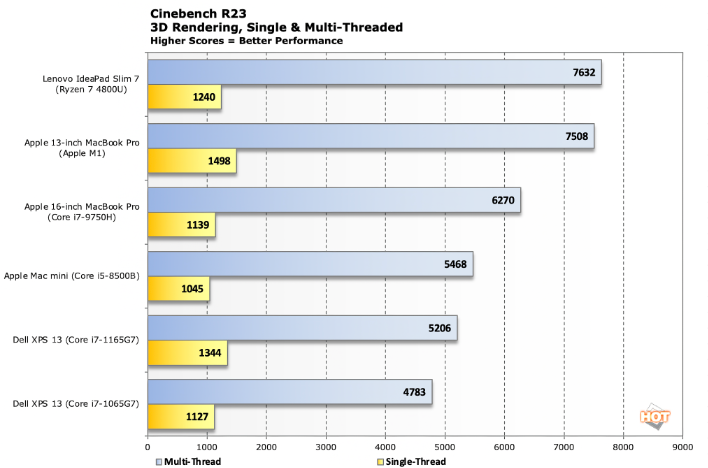Apple Macbook Pro With M1 CPU Makes Benchmark Debut Flexing Optimized App Muscle

Fortunately, some people are starting to receive their Apple M1 powered Macs a bit earlier than expected, which means that we're starting to see the first round of official benchmarks for the M1. And we must say, the results are pretty impressive so far. @mnloona48_, who is the owner of a brand new 13-inch MacBook Pro with 8GB of RAM and a 512GB SSD took to Twitter to showcase his Cinebench R23 score, which is downright impressive.
cinebench
— Ali King Fans Intl (@mnloona48_) November 16, 2020
7508 multi core and 1498 single core#MacbookPro pic.twitter.com/dWaHaQOOqn
Cinebench R23 was released earlier this month and includes specific optimizations for the Apple M1 running in macOS 11. In @mnloona48_'s case, his MacBook Pro dished out a single-core score of 1,498 while the multi-core score came in at 7,508. To put those numbers in perspective, a 16-inch MacBook Pro (2019) with the base Core i7-9750H 6-core/12-thread processor put in a single- and multi-core scores of 1,139 and 6,270 respectively. That's quite the shellacking for the new 8-core Apple M1 processor versus the 16-inch MacBook Pro.

However, we didn't want to just see how the new Apple M1-powered MacBook Pro faired against an Intel-based sibling; we also wanted to see how its stacks up to Intel- and AMD-based PCs. So, take a look at our chart below to see where the Apple M1 fits into the equation.

Looking at the numbers, the Apple M1 is most comparable to the AMD Ryzen 7 4800U in the Lenovo IdeaPad Slim 7, which is an 8-core/16-thread mobile processor with a base clock of 1.8GHz and a max boost clock of 4.2GHz. Even Dell's XPS 13 with Intel Tiger Lake onboard is no match for the Apple M1-equipped 13-inch MacBook Pro. The fact that Apple on its first at-bat is dishing out this kind of performance has us hopeful for what's coming later in the batting lineup with Intel replacements for the iMac, 16-inch MacBook Pro, and Mac Pro. But we also have to temper any excitement considering the fact that that Cinebench R23 is optimized/native for the Apple M1, and x86-64 emulated performance with Rosetta 2 won't be nearly as good. And it may take a while before all of your favorite macOS apps natively run on the Apple M1, so keep that in mind as well.
With that being said, Apple is delivering this kind of performance and at the same time [allegedly] doubling the battery life of the 13-inch MacBook Pro from 10 hours to 20 hours -- all while maintaining the same form-factor. Is this all too good to be true? We'll just have to wait and see until we can get an Apple M1-powered Mac into our lab for some more extensive benchmark analysis to see if it really lives up to all the hype.

